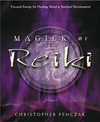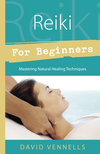Where the Paths of Paganism and Reiki Meet

As a practicing witch, I stand between many worlds. One of the first definitions that I learned from my teachers for a witch is a walker between worlds, like a shaman with one foot in the material and one foot in the spiritual. This is interpreted to be a bridge between worlds, bringing healing to people, the land, and the spirits. I accepted that role as part of my path, and have learned that I stand between many worlds. Witches often feel separate from the mainstream world when topics of religion, holidays and general life views come up, because our differences are more apparent. One bridge I didn't intend to cross was that of the world of holistic healing.
Holistic healing and alternative therapies also stand on the edge. More value is given to them, but they are not universally accepted as a complementary form of treatment. Like the shaman, they often stand outside of the village, ready to offer help.
One form of alternative healing that initially attracted me is called Reiki. Reiki means "universal life energy," and is actually a system of hands on and distant energy healing that comes to us from Japan, though spiritual lore claims Reiki has a much older lineage. The revival of the tradition, from the modern founder, a man named Dr. Usui, brought this healing energy to our current community.
I was attracted to Reiki because it is a healing art. One of my motivations to study witchcraft was its healing aspect, both magickal healing and herbal healing. I had continued my study of holistic and healing arts, from shamanism to flower essences and yoga. I wanted to expand my knowledge and experience. While I loved the practice of Reiki, I wasn't quite prepared for my journey into the Reiki community.
In an effort to gain wider acceptance in the West, many people explained Reiki as the energy that such spiritual masters as Jesus used to heal. That made the idea of hands-on healing more palatable, and even desirable to a mostly Christian audience. Though I have no doubt that the man we know as Jesus might have used the energy of the universe to heal, like many healing traditions, he was not using the Japanese system we now know as Reiki. Reiki comes out of a Japanese-Buddhist background, but in truth anyone from any spiritual tradition can practice. Having a spiritual tradition is not a pre-requisite, as well. You don't have to believe in anything, as long as you are open to the experience. Others present Reiki in a very clinical and semi-scientific way, removing any mystical or spiritual aspects to it, to make it more acceptable in the secular environments of hospitals and medical schools.
Unaware of this background in the community, I was surprised to find that many of my fellow Reiki practitioners were aghast that I was a witch practicing Reiki. Some felt the two were incompatible, inherently misunderstanding the healing and spiritual nature of Wicca. I found myself explaining witchcraft, magick, and ritual to many mystical healing people who were never exposed to the true nature of such topics, only the propaganda condemning them.
In 2002, I found myself in the position as a controversial lecturer at the New England Reiki Conference, speaking on the similarities and differences between magick and Reiki. Many of the attendants were witches, magicians, and pagans who had similar experiences to mine, but many were also Buddhists, Hindus, Jews, New Age Practitioners, and Christians. There, I outlined many of the similar points, including:
- Both connect to a divine, limitless energy.
- Both use symbols to channel energy and intention.
- Both have codes of conduct regarding how they should be used on others. Reiki is also guided by the five Reiki Principles, while magick systems such as Wicca are guided by the Law of Three and Wiccan Rede.
- Both are divided into levels of training, called degrees.
- Both use rituals to transfer someone into the tradition. In magick, there are initiations. In Reiki, such initiations are often called attunements.
- Some practitioners in each tradition use ritual, whether they realize it or not, using candles, incense, oils, and lighting to set the tone for a session.
- Some practitioners in both traditions call upon spiritual entities—such as spirit guides, deity(ies), angels, ancestors, and ascended masters.
- Both traditions often attract those with psychic gifts and abilities.
- Both traditions have been influenced by "New Age" practices, such as crystals and chakras.
These are only a few of the similarities, without getting into specific principles. To me, Reiki is a form of magical tradition. It has its own codes, lore, myths, and techniques. The paths of magick and Reiki are not so different. They are both traditions available to all to enhance, heal, and empower yourself, no matter your personal path.

About Christopher Penczak
Related Products


is subject to certain Terms and Conditions